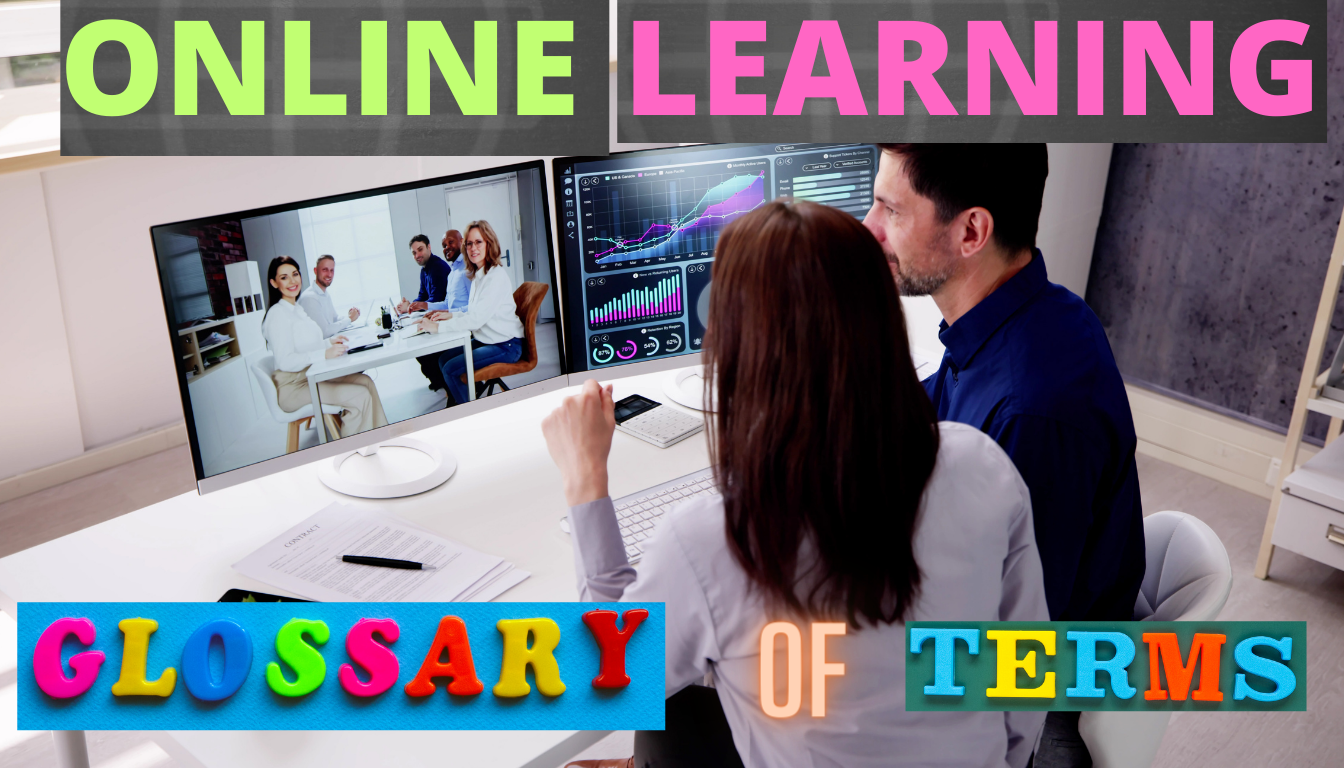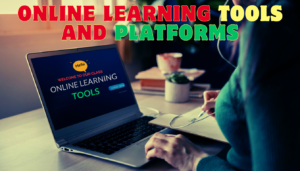Introduction
In the rapidly evolving world of digital education, navigating through the myriad of terminologies and concepts can be a daunting task. Whether you’re a student embarking on your e-learning journey, an educator seeking to enhance your digital teaching strategies, or simply a curious learner exploring the vast landscape of online education, this glossary is designed to provide you with clear, concise definitions of key terms that are pivotal in understanding and utilizing online learning platforms and methodologies effectively.
The main goal is to demystify the language of online learning, making it accessible to everyone, regardless of their prior knowledge or experience in the field. From foundational terms like “Asynchronous Learning” and “Synchronous Learning” to more advanced concepts such as “Adaptive Learning” and “Learning Analytics”, this glossary serves as a valuable resource to support your learning and teaching endeavors in the digital realm.
The terms are organized in an easy-to-navigate format, ensuring you can quickly find the information you need. As the landscape of online learning continues to grow and evolve, so too will this glossary. There is commitment to updating and expanding the entries to keep pace with new developments and innovations in the field, ensuring that this resource remains a relevant and practical tool in your educational journey.
You are invited to dive into this glossary, use it as a reference, and allow it to guide you through the exciting and dynamic world of online learning. Whether you’re brushing up on familiar concepts or discovering new ones, I hope this glossary enhances your digital learning experience and contributes to your success in the virtual classroom and beyond.
Table of Contents
Online Learning Glossary of Terms

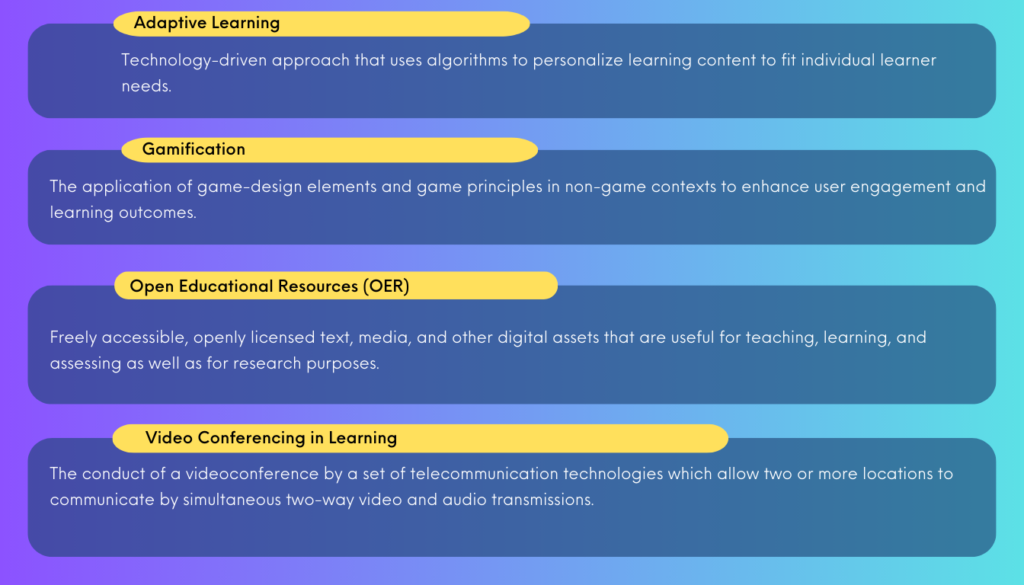
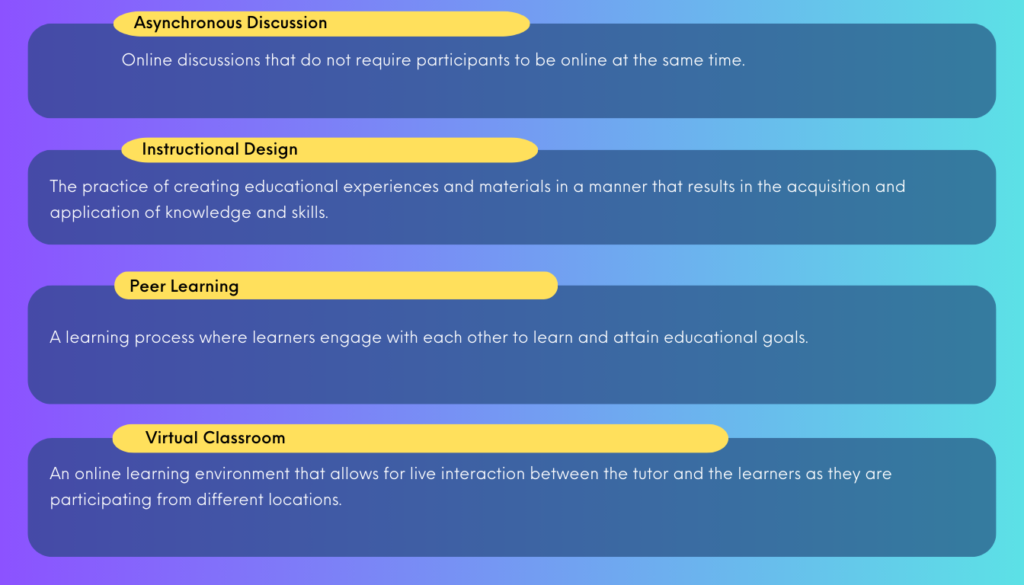
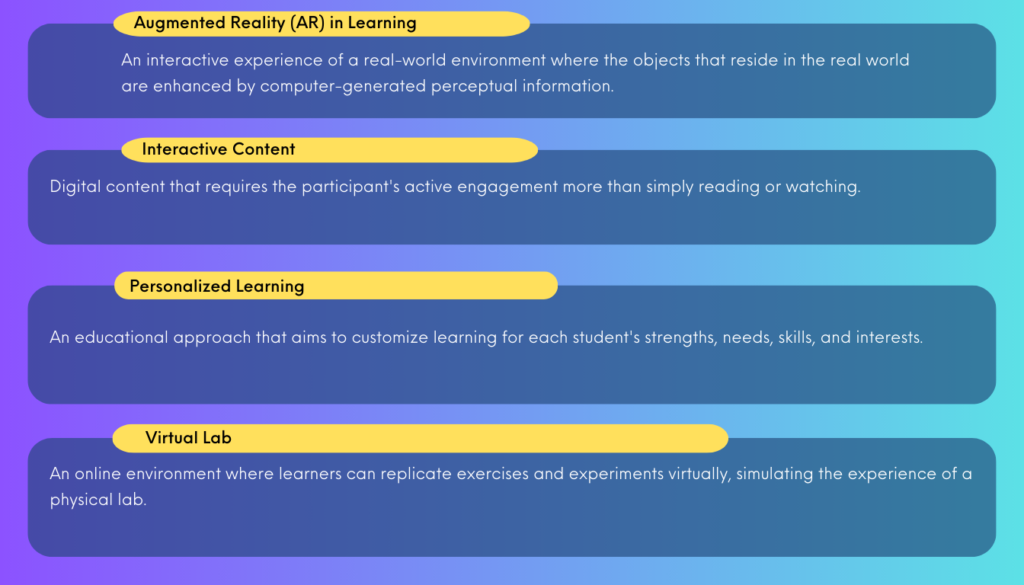
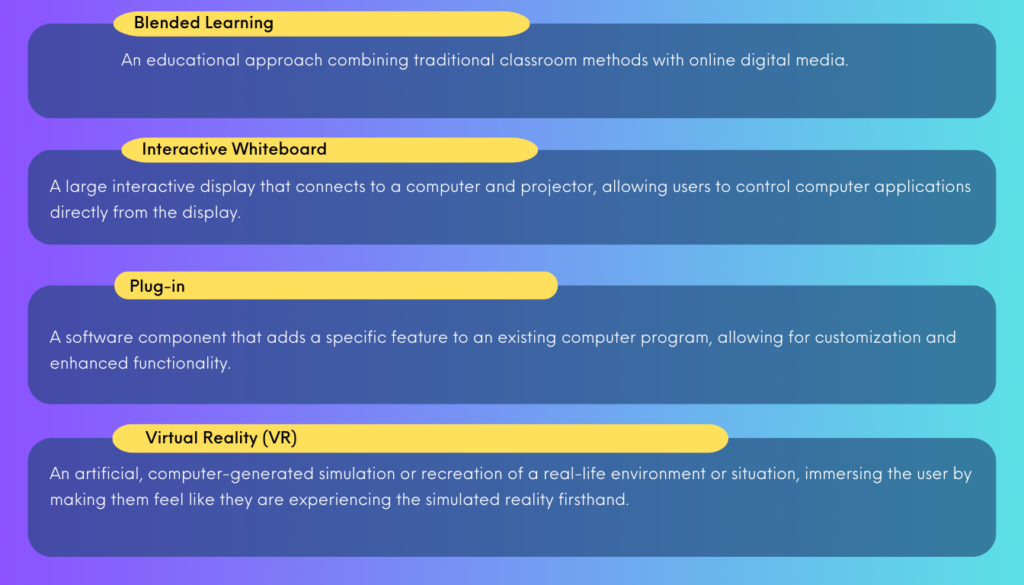
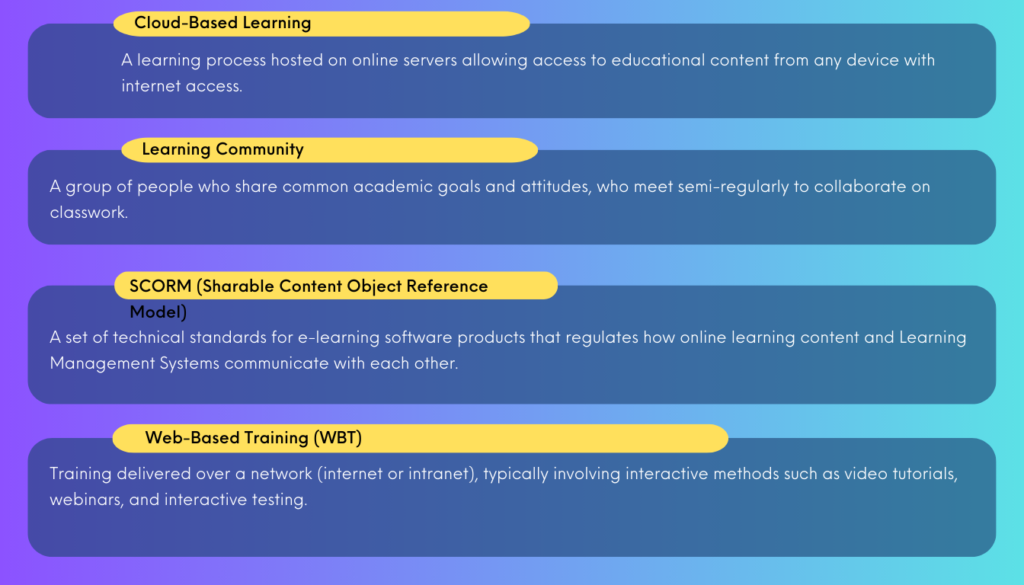
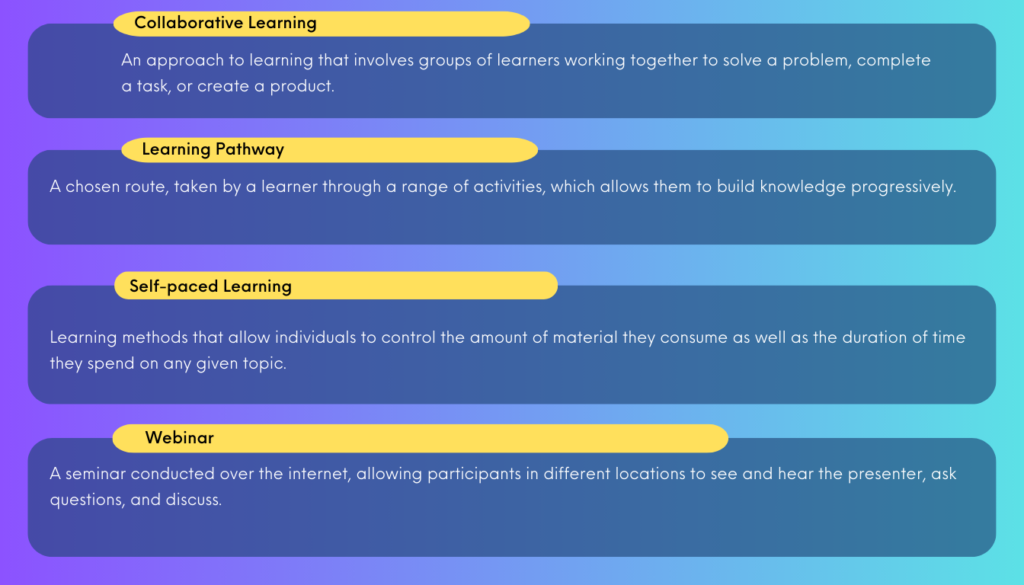
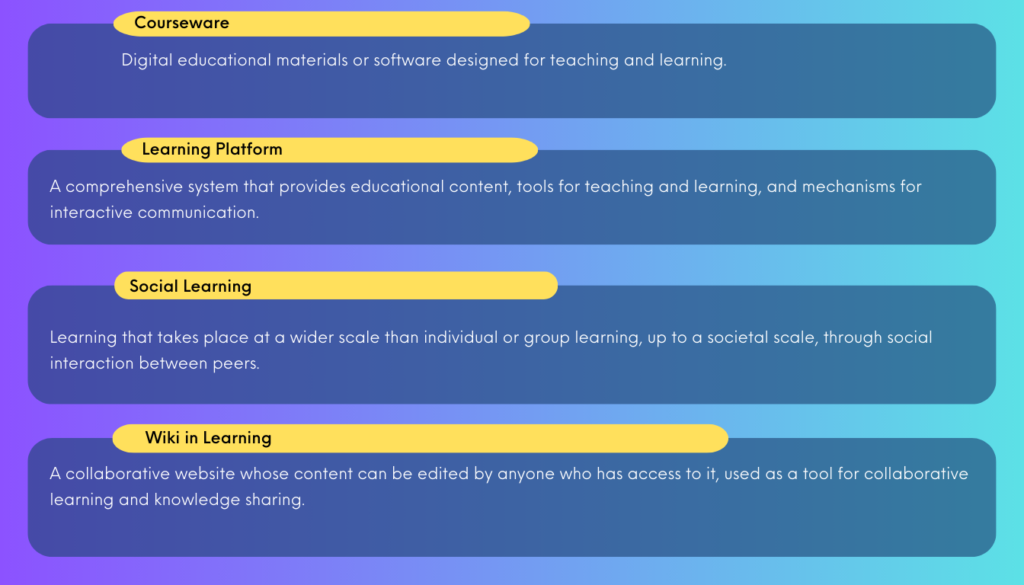
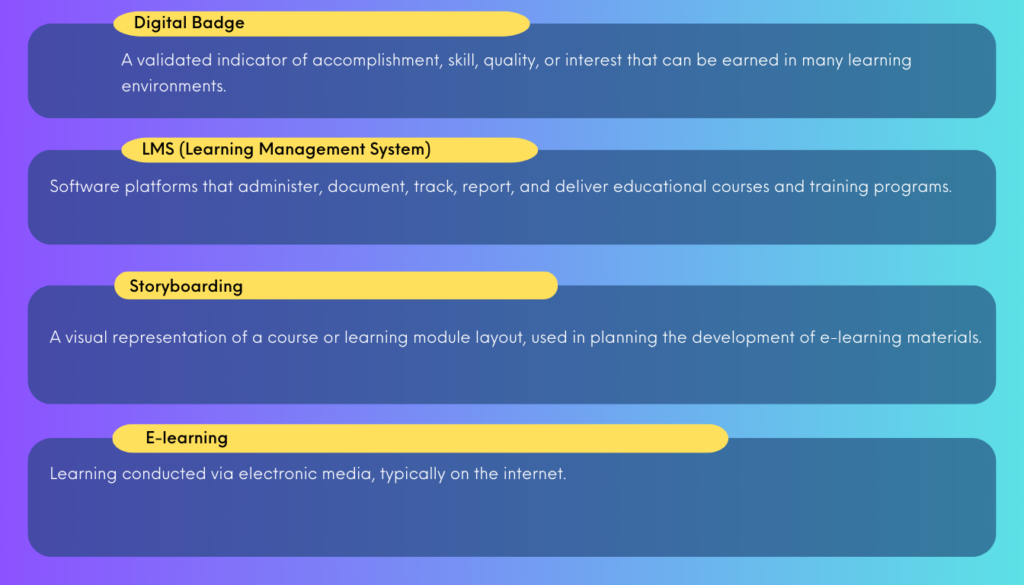
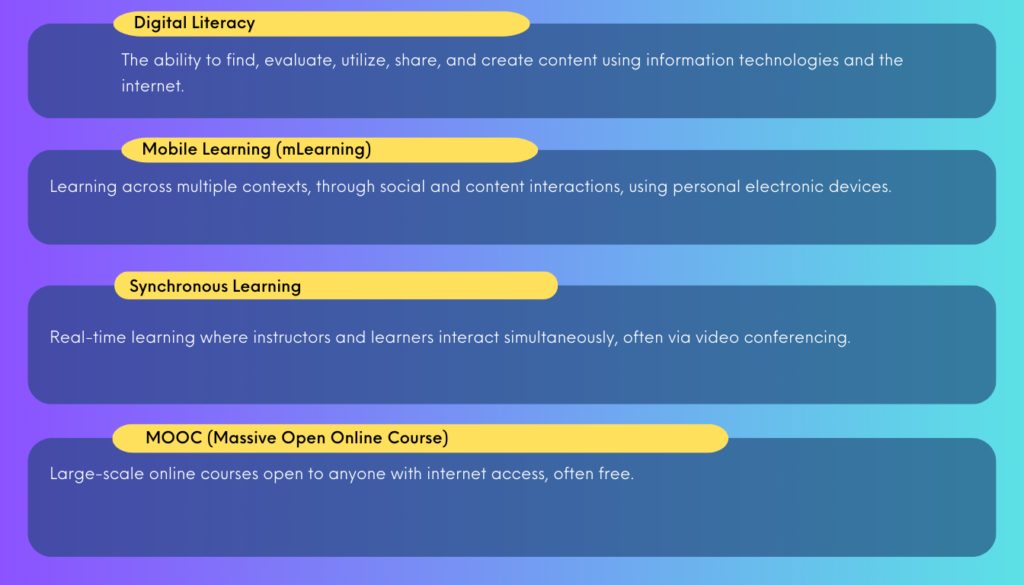
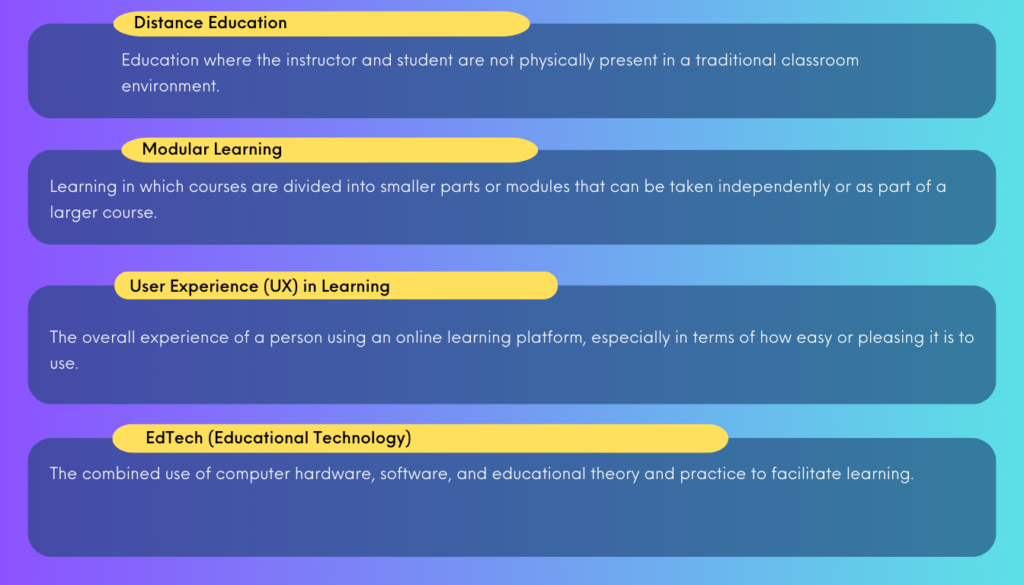
Asynchronous Learning
Learning that does not occur in real time, allowing learners to access material at their convenience.
Adaptive Learning
Technology-driven approach that uses algorithms to personalize learning content to fit individual learner needs.
Asynchronous Discussion
Online discussions that do not require participants to be online at the same time.
Augmented Reality (AR) in Learning

An interactive experience of a real-world environment where the objects that reside in the real world are enhanced by computer-generated perceptual information.
Blended Online Learning
An educational approach combining traditional classroom methods with online digital media.
Certification Course
An online course that upon completion grants a certificate to show that the participant has successfully mastered the course content.
Cloud-Based Learning
A learning process hosted on online servers allowing access to educational content from any device with internet access.
Collaborative Learning
An approach to learning that involves groups of learners working together to solve a problem, complete a task, or create a product.
Courseware
Digital educational materials or software designed for teaching and learning.
Digital Badge

A validated indicator of accomplishment, skill, quality, or interest that can be earned in many learning environments.
Digital Divide
The gap between those who have ready access to computers and the internet, and those who do not, a significant challenge in online learning.
Digital Literacy
The ability to find, evaluate, utilize, share, and create content using information technologies and the internet.
Distance Education
Education where the instructor and student are not physically present in a traditional classroom environment.
EdTech (Educational Technology)
The combined use of computer hardware, software, and educational theory and practice to facilitate learning.
E-learning
Learning conducted via electronic media, typically on the internet.
E-Portfolio
A digital collection of evidence that shows your learning journey over time. E-portfolios can relate to specific academic fields or your lifelong learning.
Flipped Classroom Online Learning
A blended learning model where traditional ideas about classroom activities and homework are reversed, with lectures viewed at home and homework done in-class.
Gamification
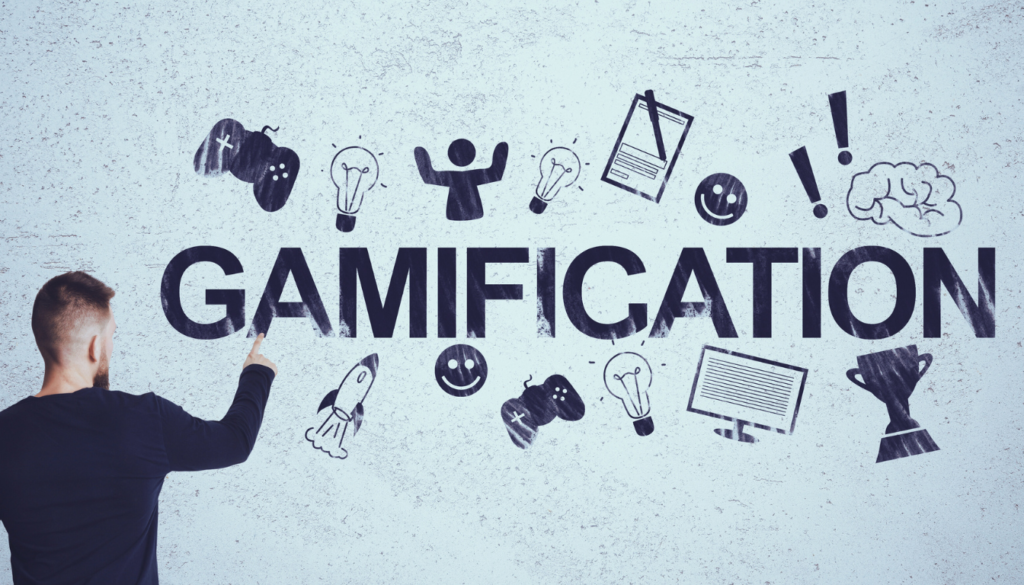
The application of game-design elements and game principles in non-game contexts to enhance user engagement and learning outcomes.
Instructional Design
The practice of creating educational experiences and materials in a manner that results in the acquisition and application of knowledge and skills.
Interactive Content
Digital content that requires the participant’s active engagement more than simply reading or watching.
Interactive Whiteboard
A large interactive display that connects to a computer and projector, allowing users to control computer applications directly from the display.
Learning Analytics

The measurement, collection, analysis, and reporting of data about learners and their contexts, for purposes of understanding and optimizing learning and the environments in which it occurs.
Learning Community
A group of people who share common academic goals and attitudes, who meet semi-regularly to collaborate on classwork.
Learning Pathway
A chosen route, taken by a learner through a range of activities, which allows them to build knowledge progressively.
Learning Platform
A comprehensive system that provides educational content, tools for teaching and learning, and mechanisms for interactive communication.
LMS (Learning Management System)
Software platforms that administer, document, track, report, and deliver educational courses and training programs.
Microlearning
A strategy of delivering content in small, specific bursts. Learners are in control of what and when they’re learning.
Mobile Learning (mLearning)
Learning across multiple contexts, through social and content interactions, using personal electronic devices.
Modular Learning
Learning in which courses are divided into smaller parts or modules that can be taken independently or as part of a larger course.
MOOC (Massive Open Online Course)
Large-scale online courses open to anyone with internet access, often free.
Online Assessment

The process of determining a learner’s progress or level of knowledge virtually, using digital tools and platforms.
Open Educational Resources (OER)
Freely accessible, openly licensed text, media, and other digital assets that are useful for teaching, learning, and assessing as well as for research purposes.
Peer Learning
A learning process where learners engage with each other to learn and attain educational goals.
Personalized Learning
An educational approach that aims to customize learning for each student’s strengths, needs, skills, and interests.
Plug-in
A software component that adds a specific feature to an existing computer program, allowing for customization and enhanced functionality.
SaaS (Software as a Service) in Learning
A software distribution model in which a cloud provider hosts applications and makes them available to end-users over the internet, commonly used for LMS platforms.
SCORM (Sharable Content Object Reference Model)
A set of technical standards for e-learning software products that regulates how online learning content and Learning Management Systems communicate with each other.
Self-paced Learning
Learning methods that allow individuals to control the amount of material they consume as well as the duration of time they spend on any given topic.
Social Learning
Learning that takes place at a wider scale than individual or group learning, up to a societal scale, through social interaction between peers.
Storyboarding

A visual representation of a course or learning module layout, used in planning the development of e-learning materials.
Synchronous Discussion
Live discussions that take place online with participants logging in at the same time to communicate in real-time.
Synchronous Learning
Real-time learning where instructors and learners interact simultaneously, often via video conferencing.
User Experience (UX) in Learning
The overall experience of a person using an online learning platform, especially in terms of how easy or pleasing it is to use.
User Interface (UI) in Learning
The means by which the user and a computer system interact, specifically referring to the use of input devices and software.
Video Conferencing in Learning

The conduct of a videoconference by a set of telecommunication technologies which allow two or more locations to communicate by simultaneous two-way video and audio transmissions.
Virtual Classroom
An online learning environment that allows for live interaction between the tutor and the learners as they are participating from different locations.
Virtual Lab
An online environment where learners can replicate exercises and experiments virtually, simulating the experience of a physical lab.
Virtual Reality (VR)
An artificial, computer-generated simulation or recreation of a real-life environment or situation, immersing the user by making them feel like they are experiencing the simulated reality firsthand.
VLE (Virtual Learning Environment)
An online system that provides an environment for teaching and learning through the integration of teaching and learning tools.
Web-Based Training (WBT)
Training delivered over a network (internet or intranet), typically involving interactive methods such as video tutorials, webinars, and interactive testing.
Webinar

A seminar conducted over the internet, allowing participants in different locations to see and hear the presenter, ask questions, and discuss.
Wiki in Learning
A collaborative website whose content can be edited by anyone who has access to it, used as a tool for collaborative learning and knowledge sharing.
Conclusion
In conclusion, this glossary of online learning terms serves as a foundational tool for navigating the increasingly complex and evolving landscape of digital education. By familiarizing yourself with these terms, you are better equipped to understand the nuances of online learning platforms, instructional strategies, and technological tools. This understanding not only enhances your ability to engage with online learning environments more effectively but also empowers you to take full advantage of the opportunities they present for personal and professional growth.
As the field of online education continues to expand, keeping abreast of its terminology will remain a critical component of your learning journey. We encourage you to revisit this glossary regularly, use it as a reference, and explore beyond these pages to deepen your comprehension and application of these concepts in your educational endeavors.
